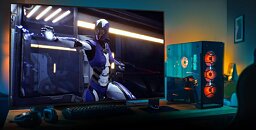Friday, June 5th 2020

LG's 48-inch OLED Gaming TV with G-SYNC Goes on Sale This Month
LG is preparing to launch its latest addition to the gaming lineup of panels and this time it goes big. Preparing to launch this month is LG's 48-inch OLED Gaming TV with 120 HZ refreshing and G-SYNC support. To round up the impressive feature set, LG has priced this panel at $1499, which is a pricey but a tempting buy. Featuring 1 ms response time and low input lag, the 48CX TV is designed for gaming and fits into NVIDIA's Big Format Gaming Display (BFGD) philosophy. Interestingly, the TV uses LG's a9 Gen3 AI processor which does content upscaling so everything can look nice and crisp. Ai is used to "authentically upscale lower resolution content, translating the source to 4K's 8.3+ million pixels. The technology is so good, you might mistake non-4K for true 4K".

131 Comments on LG's 48-inch OLED Gaming TV with G-SYNC Goes on Sale This Month
jk in all seriousness, I have never owned a 4k tv. this will be my first one. assuming i can get one, i imagine they will sell out fast. i have a 40" 1080p wall mounted now, i plan to wall mount it there and give my 40" to my nephew.
I guess 120Hz and G-Sync is better than 60Hz and Vsync but if I'm going to drop $1500 on a gaming display it better damn well have the single most important gaming feature.
EDIT: Yes, the Gaming couch is Gaming Beer-compatible, has an RGB mug holder, of course.
Edit:
Considering the features and quality of big highres gaming LCD monitors, ULMB is not that high on the list - there are a lot more painful compromizes in these.
OLED reaction time is very-very small, would ULMB even do anything useful?
The TL;DR is that 0ms OLED at 120Hz looks and feels very similar to a slower VA panel that has 8.3ms average response because sample-and-hold blur is the only real blur with modern, fast, gaming panels and pixel response is generally fast enough that it isn't the culprit when talking about blur.
I'm on my 3rd (6th if you count 90Hz+ ) high-refresh monitor and trust me that whilst more Hz definitely helps reduce the blur, even 240Hz is inferior to an old-school 85Hz CRT without ULMB.
More importantly, GPUs can't handle 120Hz at 4K in most games. Even Doom Eternal, which is phenomenally-optimsed is hovering at around 80fps on a 2080Ti.
Edit: Flicker might kind of mask it but do we really prefer flicker especially if screens can do 120Hz which is fine in terms of sample-and-hold blur in most cases.
G2G is not an issue, motion blur equally is pretty much eradicated, as is any ghosting etc.On OLED, I reckon ULMB will only darken your picture to unusable. Its not the brightest sort of panel.
EDIT: I stand corrected. Interesting piece on blurbusters, thank you!
The catch is Idk when I'll be able to actually buy this and whether sellers plan to mark them up initially (I'm hoping not, because that would put them very close to the price of the 55" version).
ULMB refers to black frame insertion or strobing backlights. Its sole design purpose is to combat sample-and-hold blur.
I even gave you a couple of highly authoritive links on the matter from the industry's leading experts.
Sometimes I wonder why I bother when people like you will just blurt out utter FUD in defiance of hard evidence.
For gaming, I'm expecting the biggest addition is HDMI 2.1.
"The C9 can display most common resolutions. To display chroma 4:4:4 properly, the input label must be set to 'PC', and for high bandwidth resolutions like 4k @60Hz + HDR, the HDMI ULTRA HD Deep Color setting must be enabled for the port in use.
LG advertises that the C9 supports a 4k @ 120Hz input from external devices, but unlike the Samsung Q90R, it appears that this only works with HDMI 2.1 sources, as we were unable to get it to work. We will retest this once we have an HDMI 2.1 source."
"Update 06/01/2020: We've retested the input lag with G-SYNC enabled using the latest firmware (04.70.05) and the score has been adjusted accordingly. Unfortunately, we were still unable to get a 4k @ 120Hz signal, we'll retest it once an HDMI 2.1 source is available. The tests were performed on a PC equipped with an NVIDIA RTX 2070 graphics card. "
www.rtings.com/tv/reviews/lg/c9-oled